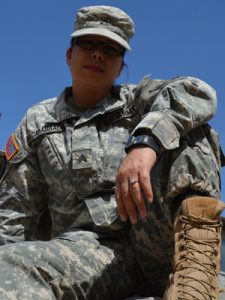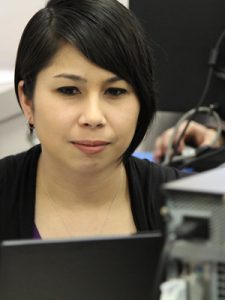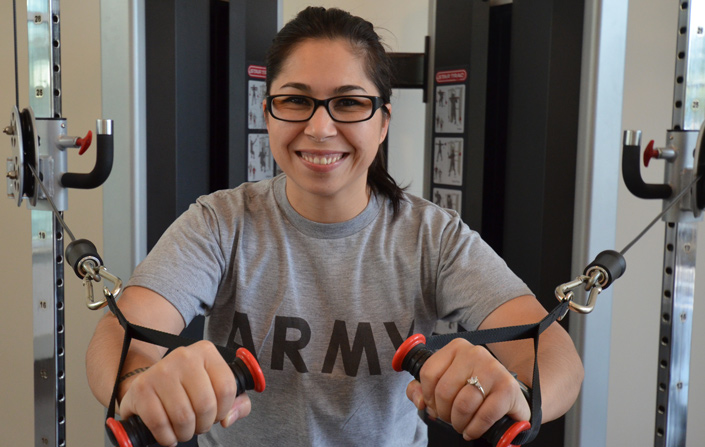In their own voice: Finding her fit
Ryen Macababbad
Current titles: Program manager, Azure Active Directory; sergeant, Army Reserve
Former title: Specialist, Army
I looked at the Army because I thought about learning a language, but I joined because I didn’t have any direction. I felt like I was undisciplined, and I needed to be stronger. That’s why I signed up for six years; I figured that by the time I was 28 I would figure my life out a bit. I was always a sort of wannabe computer nerd growing up, but I didn’t really know that I had an aptitude for computers or electronics. I ended up maintaining systems for military intelligence and did anything my unit needed in order to run an operation. From the generators all the way to the satellite communication dish, and everything in between. I got real good at troubleshooting, but I didn’t really have an excellent grasp on software.

During my service, I was deployed twice: once to Iraq and once to Afghanistan. In Afghanistan, I decided that my time in the military was coming to an end. Afghanistan was a very traumatic and painful experience. I lost a friend out there, there was a lot going on back home and in my relationship, and it just pushed that decision: Is this something that I want to continue doing or do I need to start looking at other options? I love being a solider, so much. I didn’t want to leave the Army, but I understood that my experience in Afghanistan affected me in such a way that it had degraded my performance, and it really required me to heal. So when I came back to Joint Base Lewis-McChord after nine months in Afghanistan, I started looking at my transition options.
It was one of the scariest times of my life. I’ve always had a job, since I was 15 years old. And for the past eight years I’d had everything taken care of: I knew how much I’d make every month, I knew how much my expenses were, I knew that if I ended up not being able to meet some need, there were resources there for me to fall back on. I wasn’t going to have that lifeline anymore, and that was really scary. Translating the skills that you learn in the military isn’t always a direct correlation to the private sector. What do I put on a resume? What happens if I can’t make my mortgage payment? What if I can’t feed myself? I’ve been homeless, and I’ve been hungry, and it’s not something I ever want to experience again.
As I was walking around the education center at Fort Lewis, I saw a flyer for Microsoft Software & Systems Academy (MSSA). I saw that flyer and said to myself, “I gotta get into that.”
Seizing opportunity
The best part about being in MSSA: I got an opportunity to start learning new languages — computer languages. But the most beneficial part was giving me a leg up. It was getting my foot in the door. I was guaranteed an interview at the end of the program. I’m very driven to succeed, and I was going to take advantage of every single opportunity that was presented to me. I worked really hard to prepare for that interview. And it paid off.

When I interviewed at Microsoft, I was offered two positions. I really wanted to be a part of the next new thing, the thing that was going to touch everything, and I feel that’s what Microsoft Azure is: It’s going to touch everything. In five years or less, everything is going to be connected to the cloud. And I wanted to be a part of that. When people ask me what I do for fun, I say my job is also my hobby. When I’m relaxing, I like to do things that interest me. Learning about different authentication methods and different technologies that connect you to cloud services — those are the things that I enjoy. They also happen to be a part of my job.
At the same time that I was looking forward to this next chapter at Microsoft, I didn’t want to completely cut ties with the Army, so I joined the Army Reserve. It’s a lot different than active duty. When I first got there, I was surprised at some of the things that I saw — you would never see that in active duty. But at the same time, having the relaxed standards gave me a chance to fall in love with being a soldier again. And starting in a new environment allowed me to work with a clean slate, proving my worth as a soldier without past experiences weighing on my mind.
When I think about people who are facing the same transition I did, I’d say the best piece of advice I could give them is to take advantage of whatever opportunity is presented to you. Maybe it’s not where you want to be right now, but maybe it’s a stepping stone to where you want to be in two or three years. When we come into the civilian sector, it’s a whole different ball game. You don’t have that rank on your chest that you wear around that says, “Oh, you’re a very important person.” You have to prove it. You have to show it. And the only way to do that is by starting at the bottom and working your way up.

